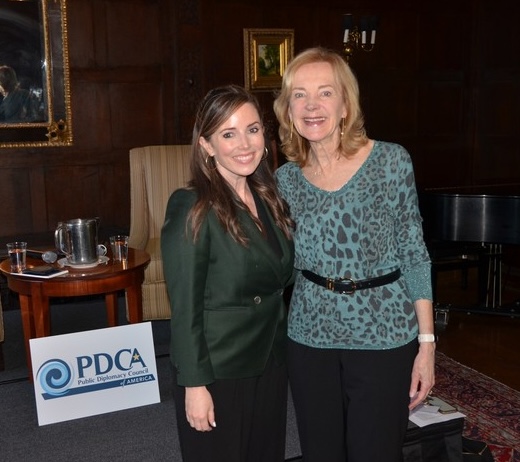Global Ties CEO Highlights Benefits of Citizen Diplomacy, by Josh Manley
How can an American shape foreign relations without being a member of the U. S. Foreign Service? The answer: citizen diplomacy.
On April 23, the Public Diplomacy Council of America (PDCA) and International Student House (ISH) hosted a fireside chat, the third in a series of programs that focused on the scope and impact of citizen diplomacy. Dr. Sherry Mueller, Distinguished Practitioner in Residence, American University (AU) School of International Service and President Emeritus of Global Ties U.S. interviewed Dr. Katherine Brown, President & CEO of Global Ties U.S., and posed questions designed to explore her views of citizen diplomacy and public diplomacy at various stages in her career.
 In front of an audience of more than 65 special guests, including Linwood Ham of Boeing, Matthew Hughes of the World Affairs Council of America, and Jerome Barry of The Embassy Series, Dr. Brown described the importance of citizen diplomacy throughout her career and how each of us can do our part to ensure that people-to-people exchanges remain a core part of America’s foreign policy toolkit in this complex era of great power competition. [In the photo, Dr. Brown, and Dr. Mueller, l-r.]
In front of an audience of more than 65 special guests, including Linwood Ham of Boeing, Matthew Hughes of the World Affairs Council of America, and Jerome Barry of The Embassy Series, Dr. Brown described the importance of citizen diplomacy throughout her career and how each of us can do our part to ensure that people-to-people exchanges remain a core part of America’s foreign policy toolkit in this complex era of great power competition. [In the photo, Dr. Brown, and Dr. Mueller, l-r.]Dr. Brown began the conversation by describing the personal impact that public diplomacy had on her at a young age. As a high school exchange program participant, she witnessed how “international relations and the Issues affecting peace and prosperity always connect back to people to people ties and human relationships?” As a Public Diplomacy aide at Embassy Kabul at the height of the War in Afghanistan, she saw how American soft power tools such as the International Visitor Leadership Program (IVLP), the Fulbright program, and the Kennedy Lugar Youth Exchange and Study (YES) Program built trust and confidence in the United States. In Afghanistan, the setting of her 2019 book Your Country, Our War: The Press and Diplomacy in Afghanistan, she distilled lessons learned and described the negative consequences that can occur when governments forget to listen to the people they try to connect with, especially when developing news narratives.
When Dr. Brown transitioned to the House Foreign Affairs Committee, she first met Sherry in 2010 when Global Ties (then NCIV) was seeking, as part of its 50th Anniversary, a Congressional Resolution. Katherine was the staff member who spearheaded the effort to declare February 16 as Citizen Diplomacy Day! As Executive Director of the U.S. Advisory Commission on Public Diplomacy, she went on to see first-hand how Global Ties U.S. showcases “the mechanics” of the IVLP.
Now leading Global Ties U.S., Dr. Brown works with 75 Community-Based Member (CBM) organizations to support greater citizen engagement in foreign affairs. Dr. Brown relayed to audience how the Global Ties CBM network “harnesses the diplomatic potential of communities and mobilizes them.” In economic terms, Global Ties and CBMs partner to turn $7 million in federal taxpayer funds into $82 million (or 11:1) generated into local economies through the IVLP. These types of exchanges also boost knowledge, skills, and networks here in the United States. Dr. Brown noted that the Global Ties U.S. Community Impact Survey found that 82% of Americans who engaged with exchange participants learned more about international affairs; 72% learned new skills that helped them contribute to their communities; and 57% said their local community’s international investment climate improved.
Turning to the audience, Dr. Brown reminded the attendees of the power they have, not only as citizen diplomats, but also as advocates for educational and cultural exchanges. She noted that phone calls, emails, and year-round engagement on public diplomacy issues matter. Cognizant that International Student House residents were in the audience, Dr. Brown reminded them that they “have a unique perspective and value-add to influencing rising leaders around the world.” She invited the students to take on the call and challenge of public service in the public diplomacy area because their cultural intelligence and cultural competency are critical for meeting today’s challenges.
Global Ties U.S. has served as the private sector partner of the U.S. Department of State’s Bureau of Educational and cultural Affairs (ECA) for the daily administration of the IVLP since 1961. Through her leadership and dedication to empowering individuals to influence and shape American foreign policy, Dr. Brown is ensuring that Global Ties’ legacy of service to citizen diplomacy continues for years to come.
Josh Manley is Program Officer and Partnerships Lead at Meridian International Center, and a member of the PDCA.